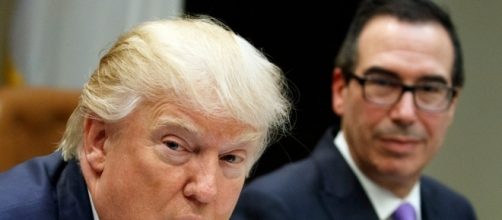That President Trump is the first American president to refuse to release his tax returns and yet is calling for a dramatic overhaul of the tax system, is obscene. The administration unveiled their "plan" on Wednesday as they promised they would before his 100-days marker, but it was in the form of a one-page outline.
It should be noted that Trump has said that he likes documents to be on one page and that he has a hard time reading anything longer than that, which would explain this plan. With the administration unable to answer some key questions for the tax code such as the impact on federal revenue or how it would grow the national debt; It's common practice that any administration should have answers to these questions when unveiling such an ambitious plan.
In the history of any administration that has come through the White House trying to approach Tax Reform, they have had to solve these problems before presenting their plan.
President Trump's income tax brackets
NEW: Five unanswered questions about Trump's tax plan https://t.co/pcsAP8hcUc pic.twitter.com/WJpLyKxqSp
— The Hill (@thehill) April 29, 2017
There are seven income Tax Brackets in the tax code that President Trump's plan wants to replace with three new ones and according to one report by The Washington Post, these are; "cut the corporate tax rate by more than 50 percent, abolish the alternative minimum tax and estate tax, and create new incentives to simplify filing returns." As to the questions on these tax brackets, the administration could not provide specifications on the income levels that would "trigger inclusion" within each of the newly introduced brackets.
In one article by conservative site the Hill, some of these questions touch on what levels of income the tax bracket rates they want will be applied to, if the child care tax plan will be the same as what he presented during his campaign, and ironically enough, what their solution would be for tax avoidance.
What Trump's tax plan has to look forward to
It appears that Trump's tax plan is already going to come up against opposition within Congress who need answers to those questions before they would even bother with it. At least one Republican has said that what the administration had presented was not tax reform. And certainly, without those questions being answered up front, it hardly is. Another Republican Rep.
Tom Cole (R-Okla.) was on NPR's weekend edition said that it wasn't that he was against the President's plan but that he just wanted more details.
Cole is on the Budget Committee and the Appropriations Committee which has the final say on the government purse. Much of the discussion over tax reform applies to the national deficit. Cole claimed that there had to be entitlement reform before they could move to tax reform. But what's even more complex are when such issues will be put into consideration among many Representatives who are already divided as it is and will be more so with what part of Trump's tax plan they should tackle first. And while President Trump might have enough knowledge of the tax system to be able to dodge paying any -- as it's been reported that he hasn't -- it's also very likely that he has little knowledge as to how tax reform works. And already at this point, it seems as if his tax plan might be a non-starter.

